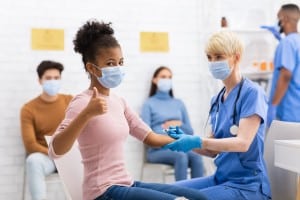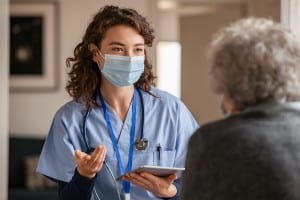As COVID-19 vaccination efforts continue, Regional One Health experts are encouraging everyone who qualifies to get their vaccine.
They say the products have been proven safe and effective through rigorous study, and the side effects are minimal.
If you have questions about whether you should get the vaccine, talk to your health care provider. They can give you factual information based on your specific needs.
Regional One Health experts are answering questions about the COVID-19 vaccines and urging everyone to get their shot as soon as they have the chance.
Sara Cross, MD, medical director of infectious disease, said vaccines are the best way to control the pandemic – but to do so, about 70 percent of people must be immunized. “These vaccines are completely safe. I have absolutely no hesitation about this vaccine,” Dr. Cross said.
“Please get the vaccine,” Chief Medical Officer Martin Croce, MD said. “It’s the only thing we have other than masks, social distancing and hand hygiene to prevent this potentially fatal virus.”
Our experts addressed questions about the Pfizer and Moderna vaccines, two of the vaccines which are currently in use in Tennessee.
How do the vaccines work?
Pfizer and Moderna developed mRNA, or messenger RNA, vaccine. Unlike other vaccines that put a weakened or inactivated germ into the body, the mRNA instead teaches our cells how to make a protein that triggers an immune response inside our bodies. The vaccine uses genetic material to tell your body to produce the coronavirus’s spike protein. “If you are exposed, your body recognizes and attacks the spike,” Dr. Croce said. “Without the spike, the virus can’t attach or invade your cells.”
Is it effective?

Rigorous testing has shown the COVID-19 vaccines to be safe and effective. Regional One Health experts encourage everyone who qualifies to get a vaccine to protect themselves and others.
Dr. Cross said in studies these vaccines were about 95 percent effective in preventing illness and 100 percent effective in preventing hospitalization or death.
Is it safe?
There are no serious health issues or increased risk of death linked to the vaccines, Dr. Croce said. In trials, the incidence of health conditions was the same as in the general public.
“This is a completely safe vaccine,” Dr. Cross said. “This messenger RNA is not going to get confused with a natural part of our bodies. Our immune systems will not attack our own natural organs or anywhere else in our body.”
Are there side effects?
Side effects are similar to those from any common vaccine: soreness at the injection site, a low-grade fever, headache and fatigue. Side effects may be more significant after the second dose.
You will not get coronavirus from the vaccines, Dr. Croce stressed: “Because of the way this is constructed, it is impossible to catch COVID from getting the vaccine. It just tells you to make the spike protein, which in and of itself is harmless. You don’t make the rest of the virus.”
Should I be vaccinated if I’ve already had coronavirus?
Yes, since it’s unknown if your antibodies are durable, Dr. Croce said. Studies show the vaccine is safe for people who had the virus and that it causes a robust immune response.
What if I have preexisting conditions?
Patients with comorbidities including diabetes and heart disease were studied during the trials. “Comorbidities are not a counterindication, and it’s especially important to get the vaccine if you have comorbidities, because you’re at higher risk,” Dr. Cross said.

If you have specific questions or concerns about receiving the COVID-19 vaccine, talk to your health care provider. They know your health history and can provide factual, expert information about the effectiveness and safety of the vaccines.counterindication, and it’s especially important to get the vaccine if you have comorbidities, because you’re at higher risk,” Dr. Cross said.
Immunocompromised patients weren’t studied but should get the vaccine. “The only time people with compromised immune systems shouldn’t take a vaccine is if it’s a live vaccine that has the potential of causing the illness,” Dr. Cross said. “This is not a live vaccine. It’s
completely safe for these patients, and if they don’t get vaccinated and they get COVID, it could be very severe.”
Do I need two doses?
There are some vaccines that only require one dose, but both the Pfizer and Moderna vaccines require two doses for full effectiveness. For the Pfizer vaccine, the second dose is given 21 days after the first. Moderna’s second dose is at day 28.
Patients receive a card that lists which vaccine they received, the date they received it and the date for their second dose. Dr. Croce suggests setting an alarm on your phone after the first dose to remind you when to get the second.
If I’m vaccinated, do I still need to wear a mask?
Getting the vaccine protects you from coronavirus, but it’s possible you could be exposed and infect someone else. “The recommendation is to continue to wear a mask, because masks not only protect us, they protect others – coworkers, friends, family,” Dr. Croce said.
What if I’m still unsure about getting vaccinated?
Talk to your health care provider. A medical expert who knows your personal health history is more trustworthy than a stranger’s unsourced opinion.
“Health care workers will give people correct information on this vaccine – that’s our job,” Dr. Cross said. “There is a lot of misinformation out there, and that’s really frustrating. We have to continue to educate people that this vaccine is safe.”
Also, look at the big picture. Getting the vaccine can prevent spreading the virus to others.

